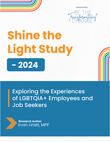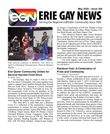The Shine the Light Report Reveals Urgent Need for Inclusive and Equitable Workplaces for LGBTQIA+ Professionals
As shifting policies and reduced funding for research threaten LGBTQIA+ rights and protections, a new annual study is shedding light on the urgent need for stronger workplace protections, intentional leadership, and active allyship for LGBTQIA+ professionals. Sponsored by Be The Transformational Change Fund, The Shine The Light Report tracks the progress and challenges of workplace inclusion, providing critical insights into the state of equity and inclusion for LGBTQIA+ professionals.
The 2024 survey, conducted from November 1 to December 13, polled 914 LGBTQIA+ individualsup from 580 respondents in 2023. Among participants, 42% identify as transgender and 58% as cisgender. Additionally, 27% identify as gay or lesbian, while 22% identify as nonbinary.
While 60% of respondents reported being out to all or most coworkers, a positive indicator of acceptance, the report reveals significant challenges. More than half (54%) of transgender respondents who are not out at work expressed fears of discrimination or harmful workplace behavior, highlighting the need for stronger protections and safer environments.
The report also notes areas of progress. Comfort in approaching leadership about discrimination increased from 23% in 2023 to 30% in 2024, signaling growing trust in workplace cultures. Over two-thirds of respondents agreed or strongly agreed that they had experienced positive support for LGBTQIA+ employees. Encouragingly, 73% of respondents identified at least two inclusive health benefits offered by their employers. However, navigating these benefits remains challenging, with many struggling to understand policies or locate specific resources.
Despite these bright spots, significant gaps remain. One in five respondents reported experiencing discriminatory behavior, with "strongly agree" responses on this issue rising from 20% in 2023 to 22% in 2024. Fifty-eight percent of respondents believe their workplace would benefit from LGBTQIA+-focused anti-discrimination training covering bias, microaggressions, and effective interventions. The report also highlights the need for LGBTQIA+ Employee Resource Groups (ERGs) and mentorship opportunities.
Representation in leadership is notably lackingonly 0.7% of over 5,400 board seats in the Fortune 500 are held by LGBTQ+ directors. As a transgender worker in technology from Chicago, IL, explained, "If you don't see people like yourself in leadership roles, it's very hard to know if it's safe to be yourself."
Inclusive health insurance policies are another critical area for improvement. A bisexual transgender woman, a manager at a Fortune 500 company in Illinois, shared, "It's become even more challenging for queer people to get the health insurance they are supposed to be getting. My employer doesn't publish a specific guide for LGBTQIA+ individuals, and it shows. The only way to get healthcare support from my current employer is to out myself."
Similarly, a gay transgender man who works as a special education teacher in Utah emphasized, "It would help for workplaces to provide a specific healthcare guide for LGBTQIA+ individuals. I had to go through six different booklets to understand if my healthcare would even be covered."
Generational and demographic data provide deeper insight into LGBTQIA+ workplace experiences. Millennial workers are the most comfortable expressing their gender identity at work (73% agree/strongly agree), while Gen Z workers are the least comfortable (57%). Asian American workers feel most comfortable expressing their gender identity (82% agree/strongly agree), while Hispanic or Latino workers feel the least comfortable (63%).
The report also reveals disparities in workplace discrimination. Gen Z workers report the highest levels of discrimination (58% agree/strongly agree), while millennial workers report the lowest (47%). By race and ethnicity, Black or African American workers report the highest levels of discrimination (58%), while Hispanic or Latino workers report the lowest (35%).
According to the findings, advocacy for local and state non-discrimination protections remains essential to secure workplace rights. The Shine The Light Report underscores the urgent need for employers, employees, and advocates to work together to drive meaningful change, ensuring that LGBTQIA+ individuals can thrive at work.
The Shine The Light Report is available here. Visit Bethetransformationalchange.org




